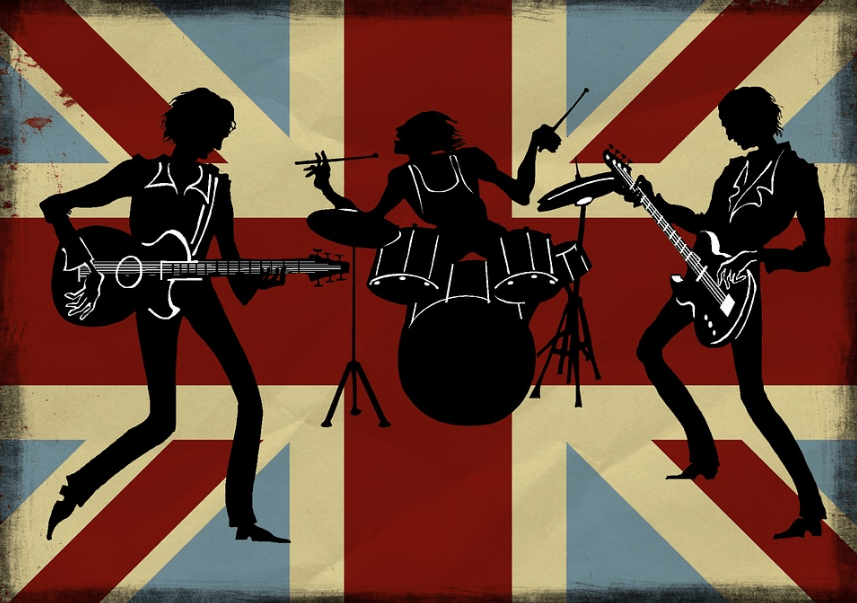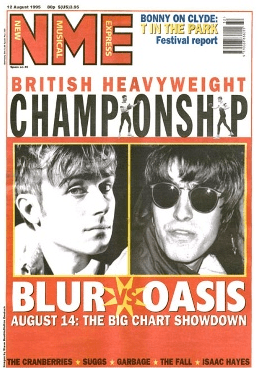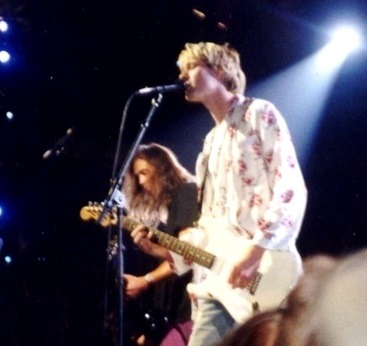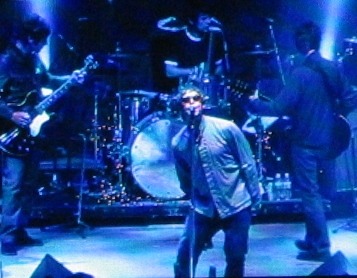Britpop is a musical and cultural movement that emerged in the United Kingdom in the mid-1990s. The emphasis of Britpop is Britishness, as its subjects focus on British concerns and British pride. Musically, it is characterized by melodic, guitar-based pop tunes, drawing consciously on the tradition of British pop music of the 1960s through the 1980s.
Apart from the local identity and the regional accent in the singing, references to British places and working-class culture are typical features of Britpop songs.
Why did Britpop exist in the first place?
Britpop emerged during the height of popularity of two music genres at the time: shoegaze at home and grunge in America. The movement started as a counter-movement to the darkness and “facelessness” of shoegaze and the grubbiness and nihilism of grunge by being the exact opposite – bright, catchy, cheerful, and upfront.
In contrast to grunge and shoegaze, Britpop was all about melodic guitar hooks and memorable choruses. The use of British cultural references and political sentiments within Britpop songs were quite a breath of fresh air for the British fans. For a long time, they had been looking for the “good ol’ guitar songs” and more intelligible, honest, and straightforward lyricism to connect with.
Oasis, Blur, Suede, and Pulp were the most successful bands during the Britpop era.
Origins and rising popularity
Many British music journalists suggest that Britpop began with either Blur, or Suede, or both. One of Blur’s earliest singles, “Popscene,” and Suede’s glam rock-driven single “The Drowners,” were released around the same time in 1992. Although both singles did not become big chart placers, they sowed the seeds of the Britpop genre.
Suede’s eponymous 1993 debut album sold remarkably well – so well, in fact, that it even broke the record for the fastest-selling record in the UK at the time.
However, 1994 was definitely (not just definitely, maybe) a banner year for Britpop. At the same time, the term “Britpop” became widely used, with numerous appearances on the radio and television, consequently consolidating the term into existence.
Rivalry between Oasis and Blur
1994 saw the emergence of Britpop’s two finest bands, who released rivaling albums. Blur’s third album Parklife became certified four times platinum in the UK, making them the most popular band for a while that year. Oasis, led by brothers Liam and Noel Gallagher, released their debut album Definitely Maybe. It became an immediate critical and commercial success, handily dislodging Suede’s debut album as the fastest-selling record in the UK at the time. Definitely Maybe even found some success in the U.S., selling over one million copies despite peaking at No. 58 on the Billboard 200 albums chart.
By 1995, another defining moment of the Britpop scene was the emerging battle of the singles between Oasis and Blur. Oasis released their new single “Roll with It” from their second album (What’s the Story) Morning Glory? It peaked at No. 2 on the UK Singles Chart. Around the same time, Blur released “Country House,” from their fourth album The Great Escape, which topped the UK Singles Chart.
The chart battle between Oasis and Blur prompted the British music press to gleefully dub it as “The Battle of Britpop.” It was said to be the biggest pop rivalry since the Beatles and the Rolling Stones in the 1960s. Media coverage for the “battle” became pretty excessive, which, in turn, gave enormous publicity for the bands themselves. Many said that the much-publicized rivalry between Oasis and Blur was the core cause of the hype surrounding Britpop itself.
The rise and fall of Britpop
In the months following the chart battle between Oasis and Blur, New Musical Express (NME) declared Britpop as a “major cultural phenomenon.”
Other Britpop bands, such as Ash, Catatonia, The Divine Comedy, Elastica, Gene, Kula Shaker, Manic Street Preachers, Menswear, My Life Story, Pulp, Rialto, The Seahorses, Suede, Superfurry Animals, Travis and others enjoyed commercial and critical successes in varying degrees. Pulp enjoyed massive success with their single “Common People” (from their fifth album Different Class), which became an anthem of the anti -”slumming” or anti- “class tourism,” as the British called it.
In 1997, Oasis released their highly anticipated third album Be Here Now. Although it initially enjoyed positive reviews and started selling strongly, the album critics became extremely underwhelmed. Even the fans and Oasis’ Noel Gallagher himself criticized the album for its overproduced and bloated sound. Many believed that Be Here Now signaled the end of Britpop.
Blur, in addition, began to distance themselves from the Britpop sound with their self-titled fifth album, released in the same year as Oasis’ Be Here Now. The album Blur presented a different sound – more of American indie and lo-fi rock than typical Britpop. Despite fears from Blur’s label, EMI, that the change in musical style would alienate the band’s largely teenage fanbase, Blur became a chart success. Its singles “Beetlebum” and “Song 2” were top ten UK singles chart hits, with the former song debuting at No. 1. Critically, Blur even found more favor in the U.S. than at home.
By the time Britpop began, Nirvana (an American rock band) was a major band in the grunge movement and had already had enormous economic success and critical acclaim. Britpop may have reacted to Nirvana’s success and the depressing nature of grunge music since it provided a happier and more uplifting alternative.
By fostering the growth of alternative music and challenging the then-dominant cultural and musical standards, Nirvana indirectly influenced Britpop. Britpop may have had more opportunities to grow and become popular because of Nirvana’s success in fostering a more welcoming climate for alternative and non-mainstream musical genres. The grunge style also probably had an influence on the Britpop movement and its embracing of a more defiant and rebellious cultural identity because of its emphasis on anti-fashion and rejection of conventional ideals.
In the wake of Britpop’s decline, a new wave of bands and artists began to appear on the charts with their softer and more accessible sound as well as introspective lyrics. Coldplay was the prime example of this. Other bands like Radiohead had considerably more esoteric musical influences that were uncommon among Britpop acts. With their brand of space rock and art rock, Radiohead went on to enjoy international acclaim and commercial success in a way that most Britpop acts failed to achieve.
Looking back, you cannot help noticing that a few of the wildly popular and successful Britpop acts are still part of the scene. The Gallagher brothers, whose personal feuds against each other seemed to attract more media mileage than Oasis’ music, still manage to have relatively successful careers. Blur and Suede have managed to survive Britpop and are still in the industry. While the rest, well… they faded into inevitable oblivion.
Britpop is seen more like a cultural movement and a marketing tool than a real musical genre. However, this short-lived movement continued the British pop music legacy that artists in the 1960s through the 1980s had started, while inspiring a new generation of UK artists along the way.
List of Britpop Musicians
There is a long list of Britpop Musicians. These musicians are generally guitar-based brands that employ the British music scene. They focus more on melody than other contemporary genres such as heavy metal and punk rock.
- 60 Ft. Dolls
- Ash
- The Auteurs
- Babybird
- Black Grape
- The Bluetones
- Blur
- The Boo Radleys
- Cast
- Catatonia
- The Charlatans
- Cornershop
- Delicatessen
- The Divine Comedy
- Dodgy
- Echobelly
- Elastica
- Embrac
- Gene
- Geneva
- Gorky’s Zygotic Mynci
- Heavy Stereo
- Kenickie
- Kinky Machine
- Kula Shaker
- The Lightning Seeds
- Longpigs
- Lush
- Manic Street Preachers
- Mansun
- Marion
- Me Me Me
- Menswear
- My Life Story
- Northern Uproar
- Oasis
- Ocean Colour Scene
- Octopus
- Powder
- Pulp
- Reef
- Rialto
- Ride
- Saint Etienne
- Salad
- The Seahorses
- Shed Seven
- Silver Sun
- Shampoo
- Sleeper
- Space
- Stereophonics
- Strangelove
- Suede
- Super Furry Animals
- Supergrass
- The Supernaturals
- theaudience
- These Animal Men
- Thurman
- Travis
- The Verve
Did you know?
Britpop has been known to be limited to one gender, but many female artists also had a big influence on the genre. Some female artists are Elastica, Louise Wener of Sleeper, Lush, Cerys Matthews of Catatonia, Lauren Laverne of Kenickie, The Sundays, Sarah Blackwood of Dubstar, Wendy Morgan of The Popguns, and Echobelly.
Britpop Songs
The following are some examples of Britpop songs by popular artists.
- “Live Forever” by Oasis
- “Don’t Look Back in Anger” by Oasis
- “Supersonic” by Oasis
- “Cigarettes and Alcohol” by Oasis
- “Wonderwall” by Oasis
- “Common People” by Pulp
- “Animal Nitrate” by Suede
- “The Wild Ones” by Suede
- “Babies” by Pulp
- “Mis-Shapes” by Pulp
- “Connection” by Elastica
- “Popscene” by Blur
- “Girls and Boys” by Blur
- “Trash” by Suede
- “The Universal” by Blur
- “To The End” by Blur
- “Parklife” by Blur
- “The Drowners” by Suede
- “End of a Century” by Blur
- “Disco 2000” by Pulp
- “Sorted for Es and Whizz” by Pulp
- “Alright” by Supergrass
- “This is Hardcore” by Pulp
- “For Tomorrow” by Blur
- “Caught by the Fuzz” by Supergrass
- “Bitter Sweet Symphony” by The Verve





